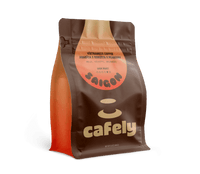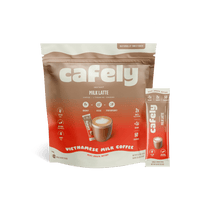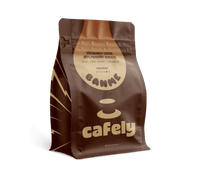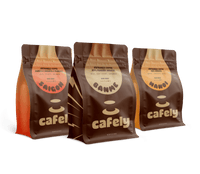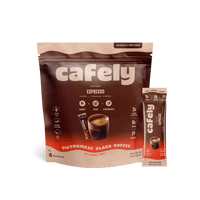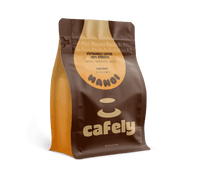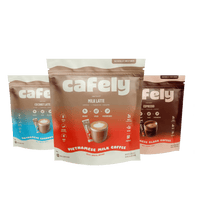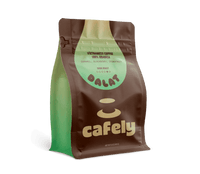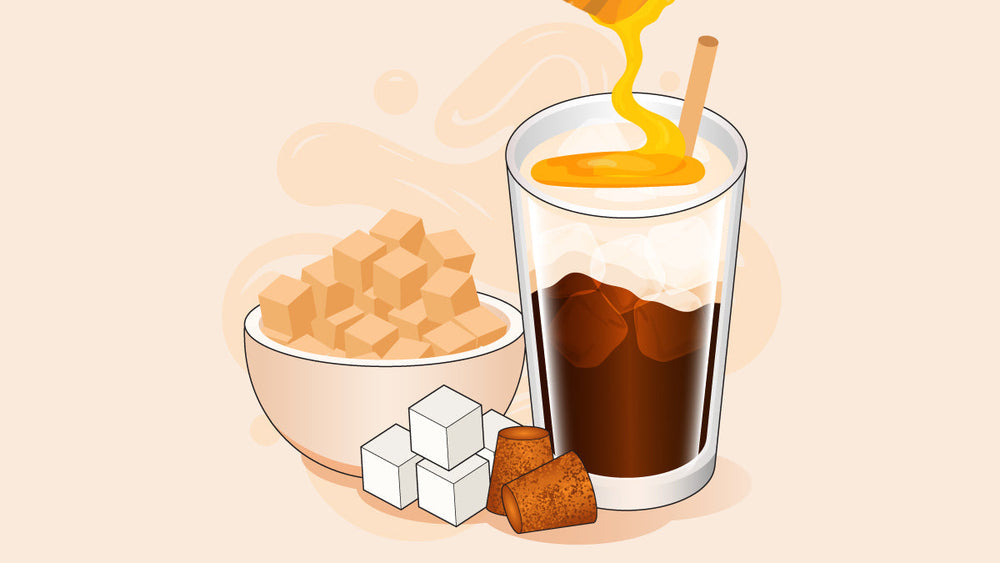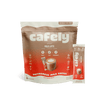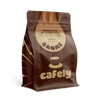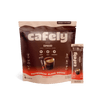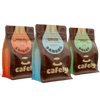Iced coffee — especially when made with milk — can be naturally sweet, but sometimes it's not quite enough. If you're searching for the best iced coffee experience, there are several ways to add sweetness to iced coffee. Sugar provides sweetness without added taste, and certain syrups provide sweetness while elevating flavor.
Where options — such as natural sweeteners or honey — may be healthier and provide a similar experience to sugar and syrup.
In this article, we look at several ways to sweeten iced coffee, from different types of sugar to sugar-free alternatives such as stevia.
For a delicious, ready-to-go instant coffee that uses all-natural monkfruit sweetener (no added sugar), try our new and improved Vietnamese Coffee 2.0!
Sweetening Iced Coffee With Sugar

The simplest, and often cheapest, way to sweeten iced coffee is with sugar.
If you're not concerned about your intake, adding a spoonful of granulated sugar to your coffee before chilling can provide the sweetness you're looking for.
However, this isn't your only option — different types offer different levels of sweetness, flavor notes, and health impacts.
Here are seven different types of sugar to try in your iced coffee:
1. White Granulated Sugar
Granulated white sugar is the most common and familiar type of sugar. It provides a clean, neutral sweetness that doesn’t interfere with other flavors in your drink (milk, coffee, or any other additives).
While it works well in hot beverages, it doesn’t dissolve easily in cold liquids — so if you're using it in iced coffee, it’s best to stir it in while the concentrated coffee is still warm.
Using white sugar is straightforward, and it's widely available, making it a go-to for those who enjoy classic iced coffee with no added complexity.
2. Brown Sugar
Brown sugar brings a deeper, richer flavor than white sugar, thanks to its natural content of molasses. It adds a warm, slightly caramelized, “burnt” undertone that pairs beautifully with dark roasts and plant-based milks like oat, almond, and coconut.
It’s especially good in iced coffee recipes that include vanilla or spices like cinnamon or nutmeg (pumpkin spice iced coffee, for example), giving the drink a comforting, indulgent twist.
Brown sugar tends to dissolve better than white sugar in cold liquids, so it can be added to cold brew. However, if you're making iced coffee, it's best to add it before chilling your brew for the best results.
3. Turbinado Sugar
Turbinado sugar — often labeled as “raw” sugar — is minimally processed and retains some of the natural molasses from the sugarcane. It has a golden color and a mild, slightly earthy flavor.
Its coarse texture gives it a “rustic” texture. However, it doesn't dissolve easily in cold liquids. For iced coffee, it’s best to dissolve it in hot coffee before cooling the brew and adding ice.
Turbinado sugar works well in drinks where you want a bit more texture, depth, and complexity, especially in bold black cold brews or simple iced coffee with milk. The taste is similar to brown sugar, but it has more earthy, “raw” undertones.
4. Panela Sugar
Panela sugar is an unrefined cane sugar commonly used in Latin America. It's a common sugar used in café de olla — also known as Mexican coffee. It’s made by boiling sugarcane juice until it solidifies, then shaping it into cone-shaped blocks or granules.
Unlike refined sugars, panela retains its natural molasses and minerals, giving it a rich, complex flavor with notes of caramel, toffee, and even a hint of smoke. In iced coffee, it offers a deeper, more robust sweetness that complements strong brews or coffee made with dairy or oat milk.
Because it often comes in block form, it must be grated and dissolved in hot coffee before it's cooled and combined with ice. Panela is a favorite among those looking for a traditional, full-bodied sweetener that adds more than just sugar — it adds character.
5. Coconut Sugar
Coconut sugar is a natural alternative to cane sugar made from the dried sap of coconut palms. It has a subtle toffee or caramel-like flavor that adds mild sweetness without overpowering the coffee.
It’s also considered to have a lower glycemic index than traditional sugars — this may be appealing to those who are more health-conscious. Though it may take a little longer to dissolve — especially in cold drinks — stirring it into hot coffee before cooling allows you to incorporate it into iced beverages.
It’s a great match for iced coffees made with nut-based milks, vanilla extracts, or coconut cream.
6. Maple Sugar

Maple sugar is created by dehydrating pure maple syrup. This results in a granulated sugar that delivers all the depth and natural, earthy character of maple syrup in a dry, easy-to-use form.
It adds a warm, distinct flavor that pairs well with fall-inspired iced coffees, particularly those that include spices like cinnamon, clove, or nutmeg — pumpkin spiced iced latte, for example.
Because it typically comes in powdered form, it doesn't dissolve as easily as syrup in cold liquid. However, it tends to dissolve better than regular and white granulated sugar.
7. Honey Crystals (Powdered Honey)
While liquid honey often clumps or sinks to the bottom of iced drinks, powdered honey or honey crystals do not. This dry form of honey dissolves surprisingly well in iced coffee and cold brew while still providing the familiar floral, warming sweetness of traditional honey.
Powdered honey is particularly good in cold brews (served black) or iced coffees that are lightly creamed with dairy-free products such as oat or coconut milk.
Honey powder is also a great option for those trying to avoid overly processed sweeteners while still enjoying a natural, complex flavor profile.
Sweetening Iced Coffee With Syrup
Using syrup instead of sugar is an excellent way to sweeten iced coffee. Not only does syrup dissolve in cold liquid far better than granulated sugar, but certain types can also improve flavor. There are hundreds of different flavored coffee syrups on the market — which is best for you comes down to taste preferences.
Here are 10 different types of coffee syrups and how they alter the taste of your iced coffee:
1. Maple Syrup
Maple syrup is a natural, unrefined sweetener that brings a deep, woody, earthy flavor to your iced coffee. Maple syrup is made by “tapping” maple trees to extract water from the cambium layer of the trunk. This water is then boiled down into a natural syrup.
It pairs beautifully with darker roasts, arabica cold brews (served black), and robusta iced coffees served with milk. Because it’s a liquid, it dissolves easily, even in cold drinks. It’s an excellent choice if you're looking for something wholesome, rustic, and natural.
2. Vanilla Syrup
The essence of vanilla is one of the most versatile, popular, and loved coffee syrups. Its sweet, creamy, tropical, floral profile complements nearly any coffee blend. Whether you're drinking a bold espresso-based iced drink with milk or a lighter cold brew, vanilla adds a smooth, mellow sweetness that complements the coffee's flavor without overwhelming its undertones.
It’s perfect for everyday use and serves as a great base for mixing with other flavors like caramel or seasonal spices.
3. Caramel Syrup
Caramel syrup is another popular, versatile coffee syrup. It delivers a buttery, rich sweetness with a touch of “burnt sugar” flavor that enhances iced coffee beautifully.
It’s ideal for those who want to create indulgent dessert-like beverages without overpowering the flavors of coffee.
When combined with milk or cream, caramel creates a silky-smooth texture and deepens the coffee’s natural flavors. It’s a staple in many café favorites like caramel iced coffees, macchiatos, and frosted version or frozen coffee.
4. Hazelnut Syrup
Hazelnut syrup brings a warm, nutty depth to iced coffee that’s comforting, indulgent, and luxurious. It works especially well with espresso-based iced brews that utilize medium and dark roast arabica.
Hazelnut is often paired with chocolate to create nutty iced mochas. It also pairs well with vanilla or caramel syrups for making dessert-inspired coffee milkshakes and iced brews.
5. Pumpkin Spice Syrup
Pumpkin spice syrup is a seasonal favorite that brings the flavors of Fall to your cup. With notes of cinnamon, nutmeg, clove, and allspice, it transforms iced coffee into a festive treat.
While it’s often associated with warm lattes — think Starbucks’ “PSL” (pumpkin spiced latte) — it works just as well in iced formats, especially when combined with whole milk or oat milk. It’s perfect for those autumn days when it’s still too warm for hot coffee but you want to settle into a seasonal vibe.
6. Crème Brûlée Syrup
Crème brûlée syrup captures the essence of the classic French dessert — vanilla custard topped with slightly burnt, caramelized sugar.
In iced coffee, it adds a rich, creamy sweetness with subtle notes of burnt sugar and cream. It pairs especially well with dark roast robusta or blended coffee, enhancing the natural cocoa notes in the beans.
This syrup is ideal for creating decadent, dessert-like iced drinks without being overly sugary or heavy. It also works well with milkshake-like brews such as frosted coffee or frozen coffee.
7. Gingerbread Syrup
Gingerbread syrup brings holiday cheer to your iced coffee with its spicy blend of ginger, cinnamon, molasses, and clove.
While typically used during the winter season for warm dessert-like brews such as the gingerbread latte, it’s a delicious option year-round if you love bold, warming flavors.
In iced coffee, it creates a spicy-sweet contrast that works surprisingly well when paired with cold milk or cream. It’s an adventurous choice that adds complexity and nostalgic flavor to your drink — no matter the time of year.
8. Peppermint Syrup

Peppermint syrup is bold, refreshing, and cooking — perfect for adding a cool, minty bite to your iced coffee.
Often used in seasonal warm coffee during the holidays, it pairs especially well with chocolate or mocha, creating the classic peppermint mocha flavor profile. The cooling contrast of peppermint syrup in warm coffee is great, but it also works well in cold brew and iced coffee.
In black iced coffee, it adds a crisp brightness; in milk-based drinks, it brings a clean finish that balances out sweetness and bitter notes.
9. Lavender Syrup
Lavender syrup introduces a delicate floral note to iced coffee that’s elegant and lightly sweet. It's best paired with light to medium roasts brewed black or dark roasts made with oat or almond milk — it adds an aromatic twist that feels sophisticated and calming.
Lavender doesn’t overwhelm the coffee but brings a gentle perfume-like finish that’s perfect for spring or summer drinks. It’s ideal for those who want to experiment with botanical flavors or create a café-inspired signature drink at home. However, it is an acquired taste — you'll either love it or hate it.
10. Rose Syrup
Similar to lavender, rose syrup adds a floral sweetness to iced coffee. It's best used in cold brews or black iced coffee. Milk doesn't blend particularly well with the aromatic floral flavors of rose.
Rose syrup is best used sparingly, as its flavor can quickly dominate the beverage. However, when balanced properly, it adds a refreshing and elegant twist that turns an ordinary iced coffee into something truly elegant.
Sweetening Iced Coffee With Sugar-Free Alternatives
Even if you're watching your sugar intake or want to cut it out of your diet completely, you can add sweetness to your brew. Several natural sweeteners offer a sugar-free way to improve the taste of iced coffee. Other natural sweeteners do contain sugar, but may be healthier than processed, granulated types.
Here are six healthier alternatives that can sweeten iced coffee:
1. Monk Fruit

Monk fruit sweetener is a zero-calorie, sugar-free alternative to granulated sugar and syrup made from monk fruit — a small gourd native to Southeast Asia. It’s incredibly sweet — sometimes up to 200 times sweeter than white sugar — but doesn’t raise blood sugar levels, making it ideal for keto, diabetic, and low-carb diets.
In iced coffee, it adds a clean, almost tasteless sweetness without bitterness. It dissolves well in cold coffee, regardless of whether it's used in liquid or granulated form.
Some blends combine monk fruit with erythritol for improved texture and easier measuring. It’s one of the most natural, zero-sugar, diet-friendly sweeteners on the market.
2. Stevia
Stevia is another plant-based, zero-calorie sweetener that's suitable for keto and no-sugar diets. It is derived from the leaves of the stevia plant and is a popular sugar alternative for people avoiding carbs and sugar — it's fully keto- and diabetic-friendly.
Stevia has a sweetness that’s 100 to 300 times stronger than white granulated sugar, so a little goes a very long way. It blends well in iced coffee, especially in liquid or drop form. Powdered stevia doesn't dissolve as well in cold liquid, but with a bit of agitation through stirring, it works.
While stevia is almost taste-free, some people detect a slight licorice or bitter aftertaste, so it may take a bit of trial and error to find the right brand, blend, and balance. Still, stevia is one of the most accessible and cheapest sugar-free alternatives available.
3. Honey
Honey is a natural sweetener rich in antioxidants and trace minerals. While it's generally considered healthier than processed cane sugar due to its nutrient content and slower absorption, it does contain sugar and calories. It's not suitable for keto or low-sugar diets.
In iced coffee, honey provides a floral, rounded sweetness. It dissolves easily in cold liquid but can be prone to clumping — especially “set honey” that's harder than the syrupy, liquid honey sold in squeezy bottles.
If you're simply trying to reduce your reliance on refined sugars — but not cut them out entirely — honey can be a flavorful middle-ground option.
4. Agave Syrup
Agave syrup — made from the agave plant — has a low glycemic index, which means it causes a slower rise in blood sugar than regular sugar. This may make it better than refined sugar for diabetics. However, it’s still high in fructose and is not sugar-free, so it’s not ideal for keto or strict low-carb diets.
Agave syrup has a smooth, neutral sweetness and dissolves easily in cold drinks, making it very convenient for iced coffee. Agave is best for those who want a natural alternative to sugar but aren't aiming for sugar-free living.
5. Allulose
Allulose is a relatively new, naturally occurring low-calorie sweetener that tastes and behaves similarly to white sugar but with only a fraction of the calories and no impact on blood glucose.
It’s keto-friendly, diabetic-safe, and lacks the bitter aftertaste found in some other sugar-free alternatives.
In iced coffee, allulose dissolves well, delivering a smooth, authentic sweetness without sharp edges, bitterness, or odd textures. It’s quickly gaining popularity among health-conscious coffee drinkers looking for a nearly identical sugar substitute.
6. Erythritol
Erythritol is a sugar alcohol that contains almost no calories or carbs and doesn't raise blood sugar levels. This makes it a great choice for keto, low-carb, and diabetic diets.
It has about 70% of the sweetness of sugar and a clean, mild flavor with a slight cooling effect — especially noticeable in cold drinks. While some report that it can cause digestive discomfort in large amounts, erythritol is generally well-tolerated and mixes well in iced coffee when dissolved properly and used sparingly.
FAQs: How to Sweeten Iced Coffee
Want to learn more about sweetening Iced coffee?
Check out the answers to the frequently asked questions below:
1. What's the Best Way To Sweeten Iced Coffee?
The best way to sweeten iced coffee is with syrup — it dissolves easily in cold coffee, adds plenty of sweetness, and enhances flavor. However, it's not the best option if you're watching your sugar intake. If you’re health-conscious, the best way to sweeten iced coffee is with a natural sugar-free sweetener such as stevia or monk fruit.
2. What's the Best Sugar-Free Sweetener for Iced Coffee?
The best sugar-free sweetener for iced coffee is monk fruit. It adds sweetness and a subtle fruitiness without overpowering the flavor of the coffee.
3. What's the Most Popular Syrup for Iced Coffee?
The most popular syrup for iced coffee is vanilla. This sweet, tropical-tasting syrup pairs perfectly with chilled, milky beverages — a common favorite when making vanilla iced coffee at home or in cafés.
4. Can You Use Honey in Iced Coffee?
Yes. Honey is an excellent alternative to processed sugar, and its floral, natural tastes pair wonderfully with iced coffee. It works perfectly in milky iced coffee and black cold brew.
5. How Much Sugar is in Dunkin’ Iced Coffee?
The amount of sugar in Dunkin' iced coffee depends on how it's ordered — plain, sweetened, or with added syrups or creamers. Plain iced coffee contains no sugar, while a regular (medium) iced coffee with syrup contains 16 to 20 grams of sugar.
6. How Much Sugar in Starbucks Iced Coffee?
The amount of sugar in Starbucks iced coffee depends on how it’s ordered — plain, sweetened, or with flavor add-ins. A plain iced coffee contains no sugar, while a regular iced coffee with the classic syrup contains 20 to 30 grams of sugar.
7. What's the Naturally Sweetest Type of Coffee?
Arabica coffee is the naturally sweetest coffee. It's higher in sugar than robusta and contains fewer bitter compounds. It also contains around half the amount of caffeine as robusta, making it perfect for people who don't enjoy strong, bold, robust coffee.
8. Does Vanilla Extract Contain Sugar?
No. Natural vanilla extract does not contain sugar. However, some imitation extracts, vanilla essences, and, of course, syrups do contain sugar. If you're conscious about your sugar intake, always check the label before adding anything to your coffee.
9. How Can I Make Keto Coffee Sweeter?
If you follow a ketogenic diet, you have to be careful with what you add to your coffee. Even a splash of milk can kick you out of ketosis. However, there are keto-friendly ways to sweeten your coffee. Opt for sugar and carb-free sweeteners such as stevia, monk fruit, erythritol, and allulose.
10. Does Adding Milk Sweeten Iced Coffee?
Yes. Milk contains lactose, which is a natural sugar. The lactose alongside milk's creaminess can naturally sweeten and balance out the bitter notes of coffee. It won't add as much sweetness as sugar or syrup, but it will make your coffee more palatable if you don't enjoy the bold, dark flavors of black coffee.
